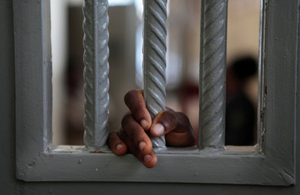Tipping the scales for women in justice: working for equality in Sierra Leone
A first-hand account from Catherine Seldon, GLD lawyer, on mentoring legal trainees

AdvocAid image credit: Tom Bradley
Volunteering for AdvocAid, a charity providing legal aid for women in prison in Sierra Leone, in 2012 was a fascinating lesson in the strengths and weaknesses of human nature and the justice system in desperate circumstances. Sadly, in a poor country with a corrupt justice system – where the police were living off the money made from unlawfully charging for bail – my experience was that the vast majority were not behind bars because they had committed a crime, but because of poverty and a lack of understanding of their legal rights. The legal aid provided by AdvocAid is therefore a massive tipping of the scales towards justice and empowerment for women detainees.
As well as providing legal advice to women in prison, my work also involved recruiting and mentoring local law students to work for AdvocAid as paralegals. Many of the female applicants to the paralegal scheme, accustomed to being hired based purely on physical appearance, were shy and not prepared (or dressed!) for the interview. It was important that our (all-female) interview panel saw past this and made the effort to coax out their true potential. Dismissing them is just what a male interviewer would have done and I felt as women we had a duty to see things from their perspective – to place their behaviour in the context of a society which tells women to set their expectations low.
One of the female students we hired, Wilbri, was constantly late. In our mentoring session Wilbri revealed that she was a young single mother and was struggling to meet her caring responsibilities. She thought that if she told us this she would be sacked. I explained that on the contrary I was very impressed with her efforts to juggle these roles, as well as studying. We arranged for her to adjust her hours to fit around her other responsibilities, and this gave Wilbri the flexibility and confidence to become integral to the team, not least because she was totally un-phased by the constant bullying from male police officers and at nearly 6 foot she could fend them off better than we or many of the other staff at AdvocAid (who tended to be less physically imposing).
The other student that I remain in regular contact with is Hawa. She was initially the only female student to apply for the paralegal scheme and although incredibly shy her dedication to empowering other women saw her make an appeal on student radio to encourage other female students to apply. Hawa is now a qualified lawyer in Freetown, working in-house for a bank and undertaking pro bono human rights work. She says she has to shout herself hoarse to be heard over male colleagues. Something that I’m proud to hear when I look back at how shy Hawa was when I first met her!
Our continued contact reminds me that I am still in my own small way contributing to female solidarity and the struggle to overthrow the structures and bias that often still exist both here and overseas, and keep women from achieving their full potential.